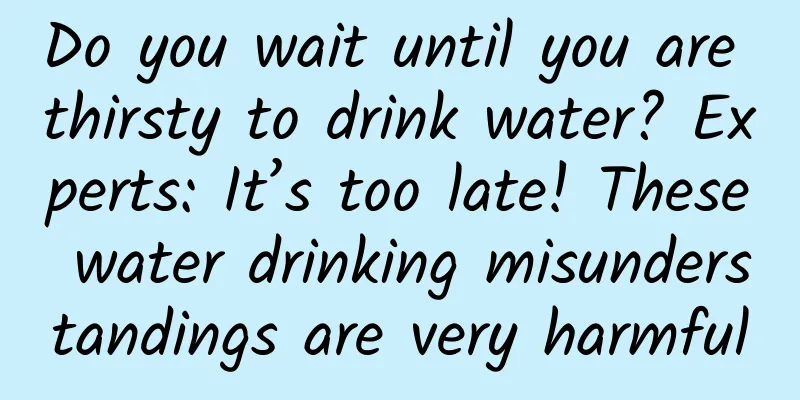Do you wait until you are thirsty to drink water? Experts: It’s too late! These water drinking misunderstandings are very harmful

|
Expert of this article: Pa Lize, Chief Physician of Nutrition, Science Popularization Committee Member of Chinese Nutrition Society Can you drink water? or Are you drinking water correctly? recently Weibo Topics #Experts suggest not to wait until you are thirsty to drink water# Trending Search Weibo screenshot Many netizens said after watching it "Have I been drinking wrong this whole time?" Indeed, drinking water is a necessary activity for each of us. Water is also needed by our body Copyright image, no permission to reprint How much water do you drink a day? When do you usually drink? Do you drink at regular intervals or only when you feel thirsty? Can drinking more water reduce blood viscosity? With these questions and your answers Keep reading! Why can’t we wait until we are thirsty to drink water? Water is distributed in our blood, brain, muscles and bones. It is an integral part of the human body and the most indispensable macronutrient for the human body. Lack of water in the body will affect the digestion of food, the transportation of nutrients in tissue cells, the redistribution of metabolic products to the blood, the timely discharge of metabolic wastes and the balanced regulation of body temperature. After a healthy adult loses 250-500 ml of body fluid, the body will do its best to restore water balance in the shortest possible time. When the brain center receives information that the blood is thickening, the fluid volume in the cells is decreasing, and the cells are slightly collapsed, the "replenish water" nerve impulse is activated, resulting in a feeling of thirst. When a person is thirsty, the brain will send a signal to the pituitary gland according to the increased water demand in the body, instructing it to release hormones to instruct the kidneys to withdraw some water from the urine and return it to the blood. At the same time, the kidneys themselves will also respond by concentrating urine and reducing excretion according to the sodium concentration in the blood flowing through the kidneys. Copyright image, no permission to reprint If this situation continues for a period of time, it will increase the risk of kidney damage and urinary stones. It can be seen that waiting until you are thirsty to drink water can easily cause dehydration. When you lose 1% of your body weight in fluid due to dehydration, your work efficiency will be seriously reduced, you will suffer from headaches, irritability, etc. If your water intake is low for a long time, it will also increase the possibility of heart problems, stroke, constipation, increased intraocular pressure, high blood pressure, kidney stones, gallstones, urinary tract infections, and pregnancy and childbirth. Although thirst is a signal of dehydration, the feeling of thirst lags behind dehydration, especially in the elderly, most of whom are slow to react to thirst, and in early childhood, people cannot correctly express the feeling of thirst. Therefore, regardless of whether you are thirsty or not, you should drink water regularly, especially healthy adults who are immersed in learning and working, and should respond actively to thirst at any time during the day. What other misconceptions are there about drinking water? Adequate water intake is the basic guarantee for the normal functioning of the body. Water is very important for maintaining a good level of health. Drinking more water can also help recover from certain diseases, but drinking more water cannot fundamentally solve health problems, let alone cure diseases. Drinking water while eating? When the stomach is not motile and the secretion of gastric juice is reduced, drinking more water will not help digestion. Instead, it will affect the secretion of oral saliva and starch digestive enzymes and the dilution of gastric juice, leading to a decrease in appetite and digestion and absorption. If children and adolescents develop the habit of drinking water while eating from an early age, it will affect their nutritional health level to a certain extent. Copyright image, no permission to reprint Can drinking more water reduce blood viscosity? Blood vessels, cells and plasma are all related to blood viscosity. Most high blood viscosity is the result of long-term accumulation of multiple risk factors. For a very small number of patients whose blood viscosity is increased due to plasma factors, drinking more water can help improve this problem. For ordinary people, the most correct and effective way to reduce blood viscosity is to change unhealthy lifestyles, eat a scientific and reasonable diet and take targeted treatments. If you blindly insist on "drinking water to reduce blood viscosity", it is easy to cause other health problems due to excessive drinking. How to drink water correctly? Our need for water depends on factors such as diet, ambient temperature and humidity, geographical location, and physical activity level. There are certain differences between people, and even the same person may have different water needs depending on the environmental conditions. The human body uses a sophisticated mechanism to keep the water intake and discharge balanced. Generally speaking, a healthy adult discharges about 2500ml of water every day through excretion, breathing, and skin evaporation, and can take in about 1000ml of water from food three times a day, so we need to supplement 1500-1700ml (7-8 cups) of water every day to ensure the balance of water intake and discharge, meet the physiological needs of daily activities such as maintaining life and work life, and maintain a healthy state. Copyright image, no permission to reprint When should you drink water? Although water is more important than food in maintaining life, eating has a fixed time, and sometimes people will not forget to eat three meals a day even if they are not hungry, but they always forget to drink water. Therefore, it is very important to make drinking water a habit regularly. At the very least, you should drink a glass of water before getting up early to wash and dress, a glass of water 30 minutes to 2 hours before and after meals, and a glass of water one hour before going to bed. You should also take the initiative to increase your water intake before and after exercise or strenuous physical activities. Patients with hyperuricemia or gout should drink at least 2000ml of water every day. As for the temperature of drinking water, you can choose warm water or ice water according to your personal adaptation habits, but you should not drink hot water above 65 degrees frequently, otherwise it will increase the risk of esophageal cancer. Recently, CCTV exposed the "alkaline water marketing chaos", reporting that some businesses promoted alkaline water products with content such as "can cure diseases" and "acid-base system theory". News screenshots Although the pseudo-scientific theory that people's body constitutions are divided into acidic and alkaline has been overturned more than a decade ago, there are still many people who are superstitious about the rumor that the body can only be healthy if it maintains an alkaline environment. Here we remind everyone that you should try to choose boiled water or light tea when drinking water, and never believe in various conceptual waters such as "alkaline water". Water is not a source of nutrients, and the sophisticated human body system will not easily change its inherent acid-base properties due to the presence of very small amounts of substances in the water. For people with high uric acid levels in their blood and gout patients, the so-called therapeutic weak alkaline water contains very little sodium bicarbonate, which does not have the effect of alkalizing urine or relieving gastric acid, and is meaningless for regulating physical fitness. Therefore, choosing boiled water or light tea is the best choice to replenish the body's water balance. Do you know how to drink water scientifically? The watermarked images in this article are from the copyright gallery, and the image content is not authorized for reprinting |
Recommend
Blizzard + strong wind + cold wave multiple warnings are issued! Please pay attention to travel safety in low temperature, rain and snow weather →
At 06:00 on March 2, the Central Meteorological O...
How to promote Xiaohongshu
With the continuous development of the Internet, ...
Foshan small program software development outsourcing company_Foshan small program developer_software production_custom outsourcing company
What are the mini program outsourcing companies i...
Ten thousand words of dry goods summary: the most comprehensive interpretation of operational data indicators
Operations and data analysis are inseparable. Bus...
Caught a cold from the cold? This may be a misunderstanding
The weather is getting cold and many people aroun...
Interview experience: WeChat, NetEase Games, Jinshan Xishanju, Renren
[[144779]] WeChat Interview Experience Backend de...
I get bloating, abdominal pain, and diarrhea after drinking milk. How should I drink milk?
Popular Science Times reporter Chen Jie May 12-18...
Are projectors really better for your eyes than TVs? Before buying a projector, just know these 3 things!
There are so many projectors on the market now, n...
Apple phones during the epidemic: absent 5G, cutting prices to survive?
During this period, Apple once again started a ra...
User packaging skills: How to become popular on Douyin?
Today, I will take Douyin as an example to talk a...
How long does it usually take to review a Tik Tok video? Tik Tok video review mechanism rules summary
Now more and more friends are joining the ranks o...
ZIVOO joins hands with Mango TV to innovate OTT ecological chain and stand out without being inclusive
Driven by the dual forces of the Internet and int...
From a monthly salary of 3,000 to 30,000, 10 tools to improve operational efficiency
The era of operation being king has arrived. As a...
Imprinting effect: Why do newborn ducklings regard the first creature they see as their mother?
Ducklings are lovely waterfowl, and their living ...
How to build a community O2O user operation system from 3 aspects
The o2o company I work for is a one-stop communit...









